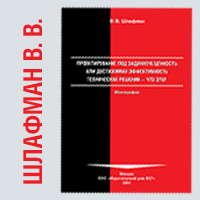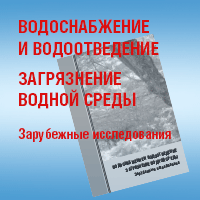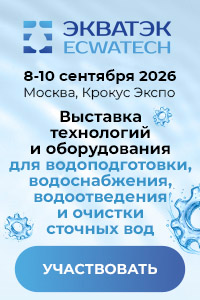№5|2017
DRINKING WATER SUPPLY
bbk 000000
UDC 628.166.094.3
Field tests of drinking water disinfection by direct electrolysis
Summary
The results of studying direct electrolysis of natural underground water with the purpose of determining possible production of low concentration sodium hypochlorite for drinking water disinfection before supplying it to the residents of Grushevskaia village of the Aksaisk District, Rostov Area are presented. The use of natural surface or underground water as electrolyte provides for eliminating the stage of artificial chloride solution making; that will simplify the technology of disinfectant production at the point of application and reduce the operation expenses. The studies were carried out in a full-scale plant in two directions: determination of the optimal parameters of the flow-through electrolyzer; determination of the lifetime of electrodes. The results of the full-scale studies confirmed possible disinfection of chloride-containing natural water (chloride concentrations 200–233 mg/dm3) by direct electrolysis. The process parameters of the electrolyzer operation with underground fresh water were determined: current density; water flow to the electrolyzer (flow rate); the time of electrode operation as an anode and as a cathode. The optimal composition of electrode coating was determined: in ruthenium –iridium oxide coating the weight ratio of Ru to Ir was 20:80. The use of iridium in the coating effects the formation of active chlorine and the electrode lifetime. The presence of ruthenium in the oxide layer in 20:80 weight ratio to iridium increases the anode lifetime tenfold (up to 4000 hours) compared to the anode without iridium.
Key words
potable water , disinfection , water treatment , direct electrolysis , electrolyzer , low-concentrated sodium hypochlorite
The further text is accessible on a paid subscription.
For authorisation enter the login/password.
Or subscribe
REFERENCES
- Pchel’nikov I. V. Sovershenstvovanie tekhnologii proizvodstva obezzarazhivaiushchego reagenta – gipokhlorita natriia elektrolizom morskoi vody (na primere Chernogo moria) [Improvement of the technology of sodium hypochlorite – disinfecting chemical production by sea water electrolysis (the Black Sea case study). Ph. D. thesis in Engineering Science. Novocherkassk, 2014, 155 p.].
- Kudriavtsev S. V. Sovershenstvovanie tekhnologicheskikh parametrov ustanovok polucheniia elektroliticheskogo gipokhlorita natriia dlia obezzarazhivaniia vody [Improvement of the process parameters of the facilities for electrolytic production of sodium hypochlorite for water disinfection. Ph. D. thesis in Engineering Science. Novocherkassk, 2009, 161 p.].
- Medrish G. L., Teisheva A. A., Basin D. L. Obezzarazhivanie prirodnykh i stochnykh vod s ispol’zovaniem elektroliza [Natural and waste water disinfection with the use of electrolysis. Moscow, Stroiizdat Publ., 1982, 81 p.].
- Breus S. A., Skriabin A. Iu., Fesenko L. N. [Development of natural water purification technology for drinking for the periods of emergency situation: production of activated sludge by water electrolysis]. Inzhenernyi Vestnik Dona, 2016, no. 2. URL: ivdon.ru/magazine/archive/n2y2016/3655 (accessed 12.04.2017). (In Russian).
- Kul’skii L. A., Grebeniuk O. S. Elektrokhimiia v protsessakh ochistki vody [Electrochemistry in water treatment processes. Kiev, Tekhnika Publ., 1987. 223 p.].







